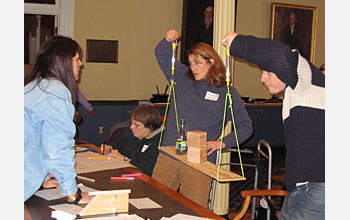|

Media Advisory 08-008
Finding What Works: Strategies for Improving STEM Education

Examining the evidence for program outcomes on the agenda for participants in the Math and Science Partnership program
January 24, 2008
Creating a stronger bridge between students' experiences in mathematics and science education in the elementary and secondary grades, so that they participate and succeed in challenging courses in college and engage fully as contributors in America's innovative workforce, is something no educator or parent would argue with. It is also the ongoing work of the National Science Foundation's Math and Science Partnership (MSP) program, which creates alliances between university faculty in the science, technology, engineering and math (STEM) fields and K-12 teachers. MSP projects around the country (see map at http://hub.mspnet.org/index.cfm ) have developed successful strategies for enhancing teacher development and mentoring, attracting more students to STEM courses, and improving student performance, including on state proficiency tests. Sharing the successful practices related to teaching, learning and partnership and identifying the evidence for linking outcomes to MSP initiatives will be the overall subject of this meeting. The meeting will be held at Hilton Washington Hotel (1919 Connecticut Ave., N.W.) in Washington, D.C., Jan. 28 and 29. A full agenda is included below, along with a listing of topics for the break-out sessions. Media interested in attending should contact Maria Zacharias at mzachari@nsf.gov, or 703-292-8454.
-NSF-

Media Contacts
Maria C. Zacharias, NSF (703) 292-8070 mzachari@nsf.gov
Program Contacts
James E. Hamos, NSF (703) 292-4687 jhamos@nsf.gov
Related Websites
2008 Math and Science Partnership (MSP) Learning Network Conference Agenda: http://www.nsf.gov/news/other_images/agenda.doc
Math and Science Partnerships Web page: http://hub.mspnet.org/index.cfm

The National Science Foundation (NSF) is an independent federal agency that
supports fundamental research and education across all fields of science and
engineering, with an annual budget of $6.06 billion. NSF funds reach all 50
states through grants to over 1,900 universities and institutions. Each year,
NSF receives about 45,000 competitive requests for funding, and makes over
11,500 new funding awards. NSF also awards over $400 million in
professional and service contracts yearly.
 Get News Updates by Email Get News Updates by Email
Useful NSF Web Sites:
NSF Home Page: http://www.nsf.gov
NSF News: http://www.nsf.gov/news/
For the News Media: http://www.nsf.gov/news/newsroom.jsp
Science and Engineering Statistics: http://www.nsf.gov/statistics/
Awards Searches: http://www.nsf.gov/awardsearch/
| 

